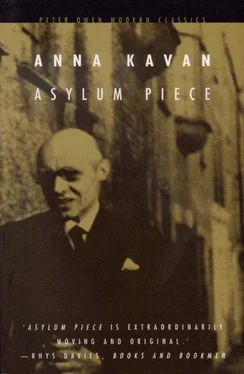As a result of these prejudices — and of course there were others which would take too long to write down here — I decided to put my case in the hands of a different advisor. This was a serious step, not to be taken lightly, and I expended a great deal of time considering the subject before I finally sent off my application. Even after I had posted the letter I could not feel at all sure that I had done the right thing. Certainly, I had heard of people who changed their advisors, not once but several times, and of some who seemed to spend their whole time running from one to another: but I had always rather despised them for their instability, and the general feeling in the public mind was that the cases of these individuals would terminate badly. Still, on the whole, I felt that the exceptional circumstances warranted the change where I was concerned. In wording my letter of application I was particularly careful to avoid any statement that could possibly be taken as detrimental to D, merely stressing the point of how expensive and awkward it was for me to be continually undertaking the long journey to his house, and asking for my case to be transferred to someone in the university town near my home.
For several days I waited anxiously for an answer, only to receive at the end of that time a bundle of complicated forms to be filled up in uplicate. These I completed, sent off, and then waited again. How much of my life lately has consisted of this helpless, soul-destroying suspense! The waiting goes on and on, day after day, week after week, and yet one never gets used to it. Well, at last the reply came back on the usual stiff, pale blue paper, the very sight of which I have learned to dread. My request was refused. No explanation was given as to why a favour which had been granted to hundreds of people should be denied to me. But of course one can’t expect explanations from these officials; their conduct is always completely autocratic and incalculable. All they condescended to add to the categorical negative was the statement that I was at liberty to dispense altogether with the services of an advisor should I prefer to do so.
I was so cast down after the receipt of this arbitrary communication that for two whole weeks I remained at home, absolutely inactive. I had not even the heart to go out of doors, but stayed in my room, saying that I was ill and seeing no one except the servant who brought my meals. Indeed, the plea of illness was no untruth, for I felt utterly wretched in body as well as in mind, exhausted, listless and depressed as if after a severe fever.
Alone in my room, I pondered endlessly over the situation. Why, in heaven’s name, had the authorities refused my application when I knew for a fact that other people were allowed to change their advisors at will? Did the refusal mean that there was some special aspect of my case which differentiated it from the others? If this were so, it must surely indicate that a more serious view was taken of mine than of the rest, as I was to be denied ordinary privileges. If only I knew — if only I could find out something definite! With extreme care I drafted another letter and sent it off to the official address, politely, I’m afraid even servilely, beseeching an answer to my questions. What a fool I was to humiliate myself so uselessly, most likely for the benefit of a roomful of junior clerks who doubtless had a good laugh over my labori'ously-thought-out composition before tossing it into the waste-paper basket! Naturally, no reply was forthcoming.
I waited a few days longer in a state of alternate agitation and despair that became hourly more unbearable. At last — yesterday — I reached a point where I could no longer endure so much tension. There was only one person in the whole world to whom I could unburden my mind, only one person who might conceivably be able to relieve my suspense, and that was D who was still, when all was said, my official advisor.
On the spur of the moment I decided to go and see him again. I was in a condition in which to take action of some sort had become an urgent necessity. I put on my things and went out to catch the train.
The sun was shining, and I was astonished to see that during the period I had remained indoors, too preoccupied with my troubles even to look out of the window, the season seemed to have passed from winter to spring. When last I had looked objectively at the hills I had seen a Breughel-like landscape of snow and sepia trees, but now the snow had vanished except for a narrow whiteness bordering the northern edge of the highest point of the wood. From the windows of the train I saw hares playing among the fine, emerald green lines of the winter wheat: the newly-ploughed earth in the valleys looked rich as velvet. I opened the carriage window and felt the soft rush of air which, not far away, carried the plover in their strange, reeling love dance. When the train slowed down between high banks I saw the glossy yellow cups of celandines in the grass.
Even in the city there was a feeling of gladness, of renewed life. People walked briskly towards appointments or dawdled before the shop windows with contented faces. Some whistled or sang quietly to themselves under cover of the traffic’s noise, some swung their arms, some thrust their hands deep in their pockets, others had already discarded their overcoats. Flowers were being sold at the street corners. Although the sunlight could not reach to the bottom of the deep streets the house-tops were brightly gilded, and many eyes were raised automatically to the burnished roofs and the soft, promising sky.
I, too, was influenced by the beneficent atmosphere of the day. As I walked along, I determined to put the whole matter of the letter and its answer frankly before D, to conceal nothing from him, but to ask him what he thought lay behind this new official move. After all, I had not done anything that should offend him; my request for a change of advisor was perfectly justifiable on practical grounds. Nor had I any real reason for distrusting him. On the contrary, it was now more than ever essential that I should have implicit faith in him, since he alone was empowered to advance my cause. Surely, if only for the sake of his own high reputation, he would do everything possible to help me.
I reached his house and stood waiting for the door to be opened. A beggar was standing close to the area railings holding a tray of matches in front of him, a thin, youngish man of middle-class appearance, carefully shaved, and wearing a very old, neat, dark blue suit. Of course, the whole town is full of destitute people, one sees them everywhere, but I couldn’t help wishing that I had not caught sight, just at this moment, of this particular man who looked as though he might be a schoolmaster fallen on evil days. We were so close together that I expected him to beg from me; but instead of that he stood without even glancing in my direction, without even troubling to display his matches to the passers-by, an expression of complete apathy on his face that in an instant began to dissipate for me all the optimistic influence of the day.
As I went inside the door, some part of my attention remained fixed on the respectable looking beggar, with whom I seemed in some way to connect myself. The thought crossed my mind that perhaps one day I, no longer able to work, my small fortune absorbed in advisor’s fees, my friends irreparably alienated, might be placed in the same situation as he.
The manservant informed me that D had been called out on urgent business but that he would be back before long. I was shown into a room and asked to wait. Alone here, all my depression, briefly banished by the sun, began to return. After the spring-like air outside, the room felt close and oppressive, but a sort of gloomy inertia prevented me from opening one of the thickly draped windows. An enormous grandfather clock in the corner didactically ticked the minutes away. Listening to that insistent ticking, a sense of abysmal futility gradually overwhelmed me. The fact of D’s absence, that he, should choose to-day of all days to keep me waiting in this dismal room, created the worst possible impression on my overwrought nerves. A feeling of despair, as if every effort I might make would inevitably be in vain, took possession of me. I sat lethargically on a straight-backed, uncomfortable chair with a leather seat, gazing indifferently at the clock, the hands of which had now completed a half circle since my arrival. I thought of going away, but lacked even the energy to move. An apathy, similar to that displayed by the beggar outside, had come over me. I felt convinced that already, before I had even spoken to D, the visit had been a failure.
Читать дальше












